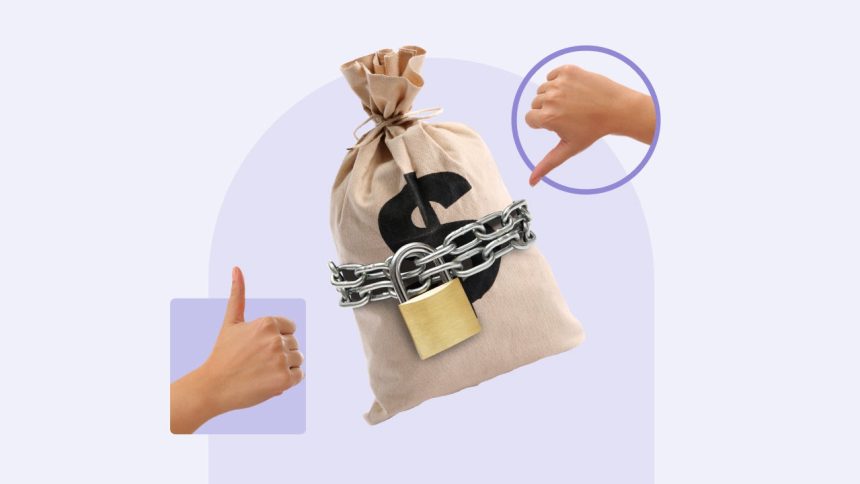Images by GettyImages; Illustration by Hunter Newton/Bankrate
Key takeaways
- Unsecured loans could fund faster than secured loans since they don’t require collateral documentation
- Unsecured loans can have higher interest rates because lenders consider them riskier
- You may have to sign a personal guarantee, making you personally responsible for repaying the loan if your business defaults
If you own a business, borrowing money can provide a financial boost when you’re ready to scale up or require more cash flow. Unsecured business loans are one popular option because they don’t require collateral and are available from traditional banks, online lenders and credit unions.
If approved, this type of loan could help with everything from covering an unexpected expense to expanding your business. But you’re likely to be required to sign a personal guarantee.
Learn about the pros and cons of unsecured business loans, including the typical expenses and requirements of this type of loan.
Compare the pros and cons of unsecured loans
Comparing the advantages and disadvantages of unsecured business loans may help you decide if this is the right type of funding for your organization.
Pros
- Don’t require assets to secure the loan
- May offer fast funding
- Accessible to different types of borrowers
Cons
- May have higher interest rates
- May have strict requirements
- May require a personal guarantee
Pros of unsecured business loans
Unsecured business loans are popular for a few reasons.
Doesn’t require business collateral
The main benefit of unsecured small business loans is they don’t require collateral like secured loans do. With secured loans, lenders often require those assets to carry as much value as the loan you want to take out. Not every company has enough assets that can serve as effective collateral.
Using assets as collateral can also be risky for some businesses. If you fail to repay the loan as agreed, the lender has a right to take the property you use to secure the loan. If you don’t have a way to secure a loan or don’t want the added risk of providing valuable assets, an unsecured loan is a good choice.
May offer fast funding
Many unsecured loans offer faster approvals and funding. You don’t need to offer any documentation showing your business collateral or wait for the lender to research and appraise the collateral’s value.
The fastest business loans tend to come from online lenders specializing in streamlined application processes and quick approvals. It’s possible to get funding within one to three days with these lenders, much faster than loans from banks and credit unions.
Accessible for various types of borrowers
You don’t have to have perfect business credit to qualify for all unsecured business loans. There are various types of unsecured loans that are accessible to borrowers with poor credit history or little time in business. Apart from a traditional unsecured term loan, businesses can explore:
Cons of unsecured business loans
Here’s a look at the drawbacks that may make alternatives to unsecured loans more appealing.
More expensive
Unsecured business loans are riskier for the lender than secured loans. With a secured loan, the lender can take the collateral to recover losses if you fail to make payments. With an unsecured loan, the lender relies more on your creditworthiness and business credentials. Lenders compensate for that higher risk through higher interest loan rates and fees.
Most unsecured business loans tend to carry higher rates than secured loans. The types of unsecured business loans also play a role in how much you can expect to pay in interest. Some unsecured options like invoice financing or merchant cash advances are considered high-risk loans, usually made to companies experiencing financial or cash flow problems.
Bankrate insight
High-risk loans available to business owners with bad credit may show the cost of an unsecured loan using factor rates instead of interest rates or APR. Make sure you know how to convert factor rates to an annual interest rate to help you compare offers from different lenders.
May have strict eligibility requirements
Another way that lenders compensate for the increased risk of offering unsecured loans is by having strict eligibility requirements. These loans are often reserved for established businesses with good credit, two or more years of experience and high annual revenue. When applying for an unsecured business loan, the lender will likely require various business documents to confirm your cash flow and revenue.
Unsecured loans for startups and business owners with bad credit are available but tend to have unfavorable terms. This includes lower loan amounts and shorter repayment periods.
May require a personal guarantee
Many lenders of secured and unsecured loans will require a personal guarantee before approving a loan. This puts your personal assets at risk if you default on the loan.
Personal guarantees are usually required for anyone who owns a certain percentage of the business. For example, many lenders will want anyone with 20 percent to 25 percent ownership to sign a personal guarantee and be personally liable for repaying the debt.
Alternatives to unsecured business loans
Unsecured business loans are just one source of funds that your company can consider. There are many other ways to get funding or borrow money for your company. Some have easier qualification requirements, let you borrow more money at once or are less expensive. Some alternatives to consider include:
- Secured loans and lines of credit: These require you to put down collateral against the loan, such as a piece of property or certificate of deposit. Because of collateral, they may have a lower interest rate than an unsecured loan.
- SBA loans: Backed by the U.S. Small Business Administration and available from a variety of lenders, they have a set maximum interest rates, making them accessible to many small businesses.
- Business credit cards: These cards operate like personal credit cards. You can use the revolving line of credit as short-term lending for projects and to pay vendors. While business credit cards typically have lower credit limits than a loan, you won’t pay interest if your balance is paid in full monthly.
- Business grants: Grants don’t have to be repaid, making them appealing. They are available from government and private sources but can be competitive and have long application processes.
- Crowdfunding: Crowdfunding campaigns allow friends, family and strangers to invest in your company. Often, it’s in exchange for a reward or equity, but they can also be donation based.
- Peer-to-peer lending. This type of lending often has the same requirements as traditional loans but is funded by a group of investors or a company, making it less formal.
When to get an unsecured business loan
Unsecured business loans offer quick access to funds without offering collateral. A business might pursue an unsecured business loan for things like:
- Working capital: Manage cash flow fluctuations or cover operational expenses.
- Expansion: Covers expansion, including hiring of additional staff or purchase of new products and inventory.
- Marketing and advertising: Invest in campaigns to attract customers and boost sales.
- Emergency expenses: Cover unforeseen costs like broken equipment or natural disasters
While unsecured loans are available to different types of businesses, they are often a better fit for those with good to excellent credit and stable revenue. Businesses with poor credit and unpredictable revenue may benefit from exploring alternative financing options, as unsecured loans can have strict requirements and higher rates due to the risk lenders take on.
Bottom line
Unsecured business loans can be a good source of funding for your company. They may have higher costs and require strong credit and business finances, but they let you borrow without risking your company’s assets. They also offer simple applications and quick funding.
Think about whether an unsecured loan is right for your company. Make sure to shop around and compare offers from multiple lenders to get the best deal. The most affordable option for you can make managing your loan and business easier.
Frequently asked questions
-
Yes, many banks offer unsecured business loans with no collateral. But your company will need a strong financial history and good credit to qualify.
-
Many types of business loans don’t require collateral. Some examples include unsecured term loans, lines of credit, invoice factoring and financing and merchant cash advances.
-
If you get denied for an unsecured business loan, you can consider applying with another lender or looking at a different type of unsecured loan. If you’re having a lot of trouble getting approved, consider a secured loan instead.
Read the full article here
















